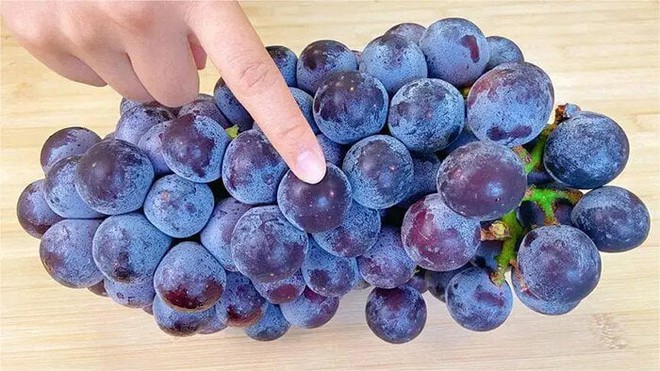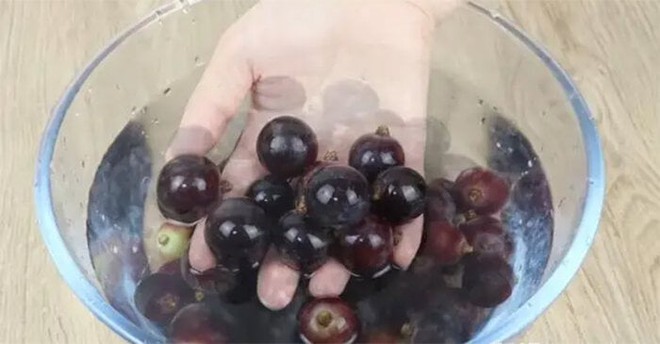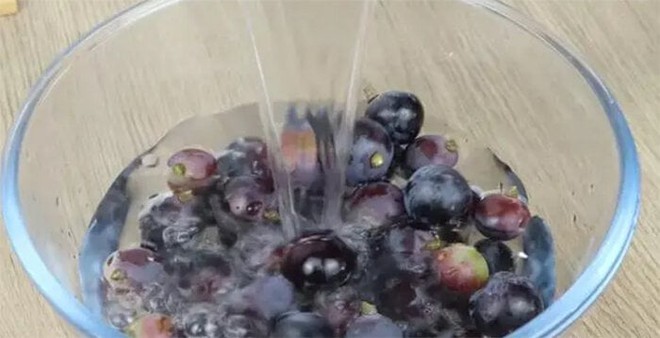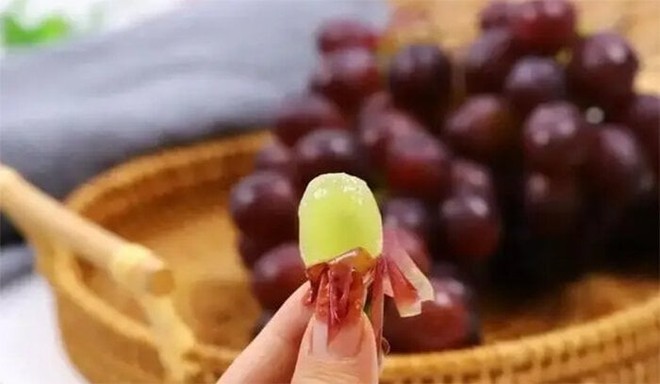Grapes are one of the most nutritious fruits. They are rich in vitamin K, calcium, magnesium, and potassium, all of which contribute to stronger bones. The high vitamin C content in grapes boosts immunity. As our bodies don’t produce vitamin C, we need to obtain it from our diet, and grapes are an excellent source.
Grapes are packed with antioxidants, including quercetin, which protects against neurodegenerative diseases and guards against Alzheimer’s. Polyphenols support gut health and boost immunity…
Mistakes When Washing Grapes
Grapes come in clusters with multiple layers, making it challenging to clean the inner grapes thoroughly. The spaces and crevices in the bunches can harbor dirt, bacteria, and parasites. The sweet, fragrant juice released from broken grapes also attracts insects and provides a favorable environment for bacterial growth.
Rinsing grapes with plain tap water may not effectively remove bacteria, parasites, and harmful chemical residues (if present) from the bunch. Agricultural and food safety experts caution that farmers may use large amounts of pesticides to protect grapes from insect damage. Inadequate washing can leave pesticide residues on the skin and in the crevices of the grapes, posing health risks.
Another common mistake is washing the entire bunch of grapes, either under running water or in a large basin. This method fails to clean the crevices and inner grapes effectively, essentially transferring bacteria, chemicals, or parasites into your stomach.

The crevices in the grape clusters are breeding grounds for various parasites. (Image: Sohu)
Experts also believe that farmers may use excessive pesticides to prevent insect damage to grapes. Inadequate washing can leave pesticide residues on the skin and in the crevices, which may be harmful to your health.
Proper Way to Wash Grapes
So, how should you wash grapes? Follow these steps:
– Use scissors to cut the grapes from the stem. This prevents contamination from the stem, and the grapes will stay fresh longer after washing.
– Fill a clean basin with water and add a teaspoon of salt to create a grape-washing solution. Salt is a natural disinfectant and can effectively kill bacteria and insect eggs on the grape’s surface. Then, add a small amount of baking soda, a gentle cleanser that removes pesticide residues and dirt.

Add salt and baking soda to the grape-soaking water. (Image: Sohu)
Now, add a teaspoon of flour to the basin. Flour has a strong absorbent property and can easily remove dirt from the grape’s surface, especially the sticky residue. Stir gently, then let it sit for 10 minutes. This allows any small moth eggs and larvae on the grapes to float to the surface due to their inability to breathe underwater.
After 10 minutes, you’ll notice that the dirt on the grape’s surface has been washed away. Gently rub the grapes with your hands to ensure all dirt is removed.
Following this cleaning process ensures the grapes are safe to eat. As a final step, rinse the grapes under running water to remove any remaining residue, then enjoy!

After soaking the grapes, rinse them under running water for extra cleanliness. (Image: Sohu)
Rest assured that salt, flour, and baking soda are harmless to the human body, making this cleaning method entirely safe.
How to Choose Delicious Grapes
– Visual Inspection: Fresh grapes have a delicate white coating, a natural protective layer that prevents moisture loss and bacterial invasion. If the grapes lack this coating or have spots, cracks, or discoloration, they are either unripe or damaged. Ripe grapes have a vibrant color, while duller grapes are overripe.
– Inspect the Stem: The stem of fresh grapes is firm, stiff, and green. Older grapes have dry, yellow, or brownish stems. If there’s a gap or looseness between the stem and the fruit, the grapes are likely old or dehydrated. Mold spots or insect eggs on the stem indicate spoilage or bacterial contamination.

When choosing grapes, pay attention to color and taste. (Image: Sohu)
– Taste: Fresh grapes are sweet and juicy, while old grapes taste sour and lack flavor. If the grapes have an odd or bitter taste, they may contain pesticide residues or other contaminants and should be avoided for health reasons.
The Ultimate Guide to Sparkling Clean Grapes
“For those who adore the tangy, sweet burst of flavor that fresh grapes offer, there’s often one nagging issue: the pesky layer of powdery residue that clings to their surface. It’s a tedious task to wash them thoroughly. But fear not, as baking soda is here to save the day and make your grape-washing woes a thing of the past.”










